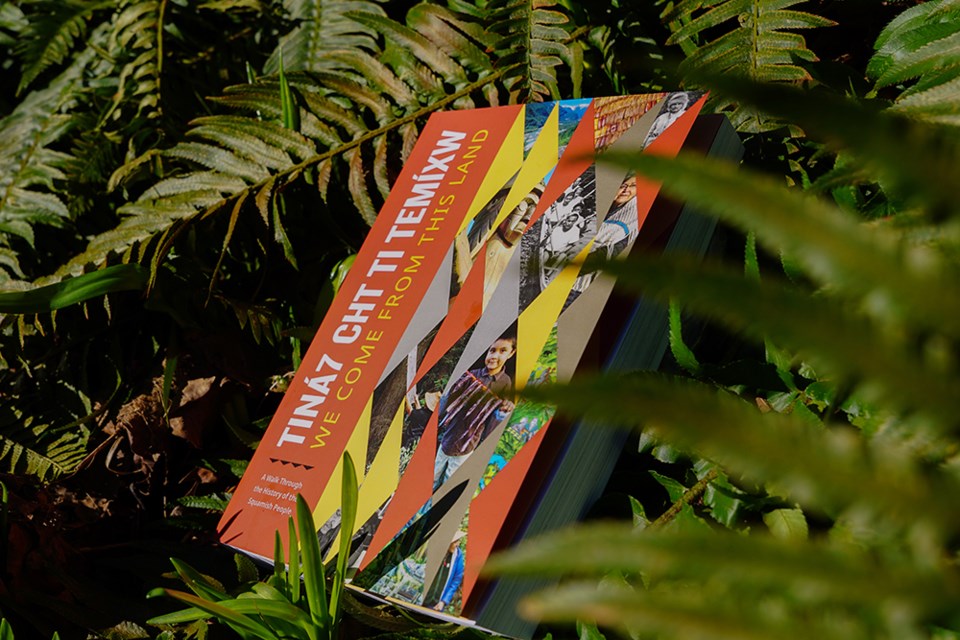“Why aren’t they talking about our history?”
It was a simple question asked by a curious granddaughter one afternoon some 15 years ago, but a question on high school curriculum that would go on to light a fire inside one particularly proactive papa. Why weren’t Sḵwx̱wú7mesh (Squamish) kids learning about their Nation’s vast and significant history?
Tiná7 cht ti temíxw (We Come From This Land) has been brewing in the mind of Squamish Nation Elder Paitsmauk (David Jacobs) since that very afternoon, a book that would detail the history of the Nation in a way that was approachable for children, empowering for community members, and educational for non-Indigenous communities.
Written by Squamish journalist Kwetásel’wet (Stephanie Wood) and a large research team spanning archeologists, Nation staff members, Elders and historians, the book covers Squamish history from the Nation’s very beginnings as multiple different Indigenous communities to its present day stance as a band with more than 4,000 members.
It pulls from Squamish archives, academic books, personal memoirs and word of mouth accounts from community members to detail all facets of Squamish living, from the Sḵwx̱wú7mesh Sníchim (Squamish language) to its government, traditions and development.
It is extensive but not comprehensive, merely a drop in the bucket of a history that is too vast and multitudinous to be squeezed into one singular book, says its author.
“This was never going to be a definitive book on our history. It is an introduction, a launching point for people to really engage with our history,” explains Wood.
“Something we noted from the very beginning was the importance of respecting the parameters of our histories, because there is not just one history, and to encapsulate all of that would be impossible.”
With much of Squamish Nation history being oral, passed down from generation to generation, events, traditions and cultural knowledge can vary from family to family, she adds. All accounts are correct, and condensing them all into one place would make for a book so large it would be intimidating and impossible to read.
Deciding what information would make the cut was a matter of striking the right balance between celebrating the positive and uplifting elements of Squamish culture and narrative, and highlighting the darker moments of Indigenous history, says Wood.
It’s why the chapter that contains the horrors of the residential schooling system ends with an uplifting mention of how, against all odds, Squamish people held onto the language, sought out their truths in the years following and are now pursuing recovery.
“Many of those tragic events make up such a small portion of our long history of being strong and adaptive, and responding to the changes of the world around us,” says Wood. “It was really about treating this whole thing with love. When you’re writing about your own people, you’re thinking about them with such care that you’re not going to ever get to a place where you’re being exploitative.”
For members of the Squamish Nation, the book offers a route to reconnect with their history and bolster themselves with enough information to pass on to the next generation. With the preservation of the Nation’s history and culture now a such a prime concern for members, the book will be a vital tool for education.
“We’re losing a lot of our knowledge keepers, our Elders, our leadership of the past,” says Sxwíxwtn (Wilson Williams), elected council members. “So I think this eases the anxiety of our Elders and our adults.… I think in some cases, it’s going to trigger people to really look deeper into the true history of the Squamish people.”
Williams said We Come From This Land has already prompted much conversation between himself and Elders, and he hopes the book brings about a “healthy openness” for children like his daughters to ask their own questions.
“It’s precious, especially for our children and youth and the next generations, because it’s a reference point to really empowering our people,” he said.
The book can be purchased in local bookstores or via the Squamish Nation website.
Mina Kerr-Lazenby is the North Shore News’ Indigenous and civic affairs reporter. This reporting beat is made possible by the Local Journalism Initiative.




